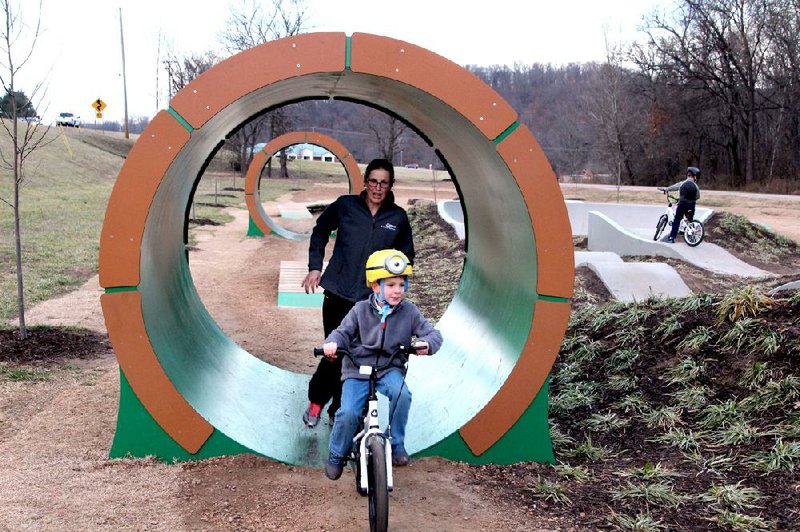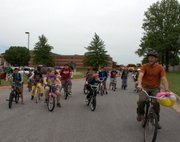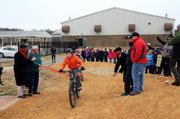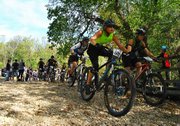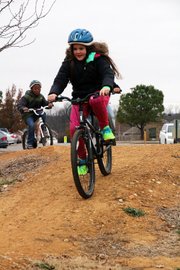ROGERS -- "All aboard!"
RELATED ARTICLE
http://www.arkansas…">Wheels turning
It's 7:15 a.m. on a chilly weekday morning, time for the "bike bus" to begin its scheduled pickup route. Jim Brown mounts his bicycle to exit the Joe Mathias Elementary School grounds.
Within a block he pedals past a miniature version of himself waiting on a bike at the end of a driveway. The youngster files in behind as Brown continues along the street.
This procedure is repeated with a growing number of student-cyclists "boarding" the bike bus to pedal through the neighborhood. After circling on the streets, the young cyclists follow Brown back onto the school grounds. These children start their day with invigorating exercise instead of sitting half-asleep inside a car or bus.
It was spring 2010 when Brown, the school's physical education teacher, began his bike bus. Each teacher at the school had been asked to perform duties outside of normal teaching assignments, so Brown decided he would fulfill his commitment by creating a safe way for kids to ride their bikes to school.
"Nonstop fun," as Brown describes it.
Every journey begins with a first step, and for today's youth Bike Ed program in Northwest Arkansas schools, this bus was that milestone first step.
But other people also contributed to making the region's Bike Ed program so impressive it was cited by the International Mountain Bicycling Association as a key factor in its selection of Bentonville to host the World Mountain Bike Summit in November.
TAP IN
Another early champion of the area's youth bicycling programs was Laura Kelly of Winslow. Living in Fayetteville in the 1990s, Kelly became passionate about bicycling and didn't even own a car. With son Quinn in tow in a trailer, she pedaled the city streets to do all her errands and shopping.
In 1999, eager to share her love for cycling, she formed the nonprofit Bicycle Coalition of the Ozarks (BCO).
After several frustrating years advocating bicycles as a viable means of transportation, and then deciding that "it would be a lot more rewarding to instill positive cycling associations in children rather than to try to change negative attitudes in adults," she redirected her focus.
In 2010, through a grant from the federal Transportation Alternative Program, she bought 40 bicycles, helmets and trailers to haul the bicycles. With the equipment and a physical education curriculum she had written, she partnered with Fayetteville schools, grades three through five, to teach safe bicycling.
The program entailed hauling the bicycles to each of Fayetteville's elementary schools, where, following Kelly's curriculum, the school's PE class taught bicycle etiquette, safety and skills for a two-week period.
Kelly's husband, Dan Dean, produced a video documenting the Bike Ed program (see tinyurl.com/zdlfsf9).
In 2012, Kelly and Paxton Roberts, who had joined BCO as executive director, helped Alan Ley, then director of Bike Bentonville, and Ley's wife, Mary, write a grant to develop Bike Ed programs for the Bentonville schools, grades three through 12. With the grant, funded by the Walton Family Foundation, they bought 500 bicycles and helmets, enough for each school to keep at least 30 bikes on-site to be used in PE classes.
Using the experience gained from creating Bentonville's Bike Ed, as Roberts says, "They designed a 'Bike Ed program in a box' guide that could be followed by each school in the Northwest Arkansas area to create their own program."
Following the Bentonville model, Roberts worked with Holly Johnson, communications director for Fayetteville Public Schools, to buy 530 bikes and helmets to implement Bike Ed programs for all the cities' schools, grades three through 12.
Next, Roberts took the "Bike Ed program in a box" to Springdale to set up programs in schools there.
During this period, Rogers schools also implemented Bike Ed programs at their junior high and high schools. BCO was not involved, but it gave the schoolteachers advice on training students in bike safety, etiquette and handling skills.
Roberts says that nowhere else in the nation will you find a districtwide organization like the one assembled in Northwest Arkansas, one where four school districts are working as a team, sharing best practices learned working together to bring cycling to the students.
By this time Roberts' BCO position had grown into nearly a full-time job (he was also assistant director of the Terrorism Research Center at the University of Arkansas). With more than 1,500 bicycles in area school districts, one of the projects he worked on with the schools was training the students to perform basic maintenance.
To handle more complex repairs, Roberts helped schools obtain discounts from area bicycle shops.
ON THE PATH TO OFF-ROAD
While Northwest Arkansas' Bike Ed programs were evolving, mountain biking in the area was also experiencing a boom in popularity, with many new trails developed. Mountain bikes were used in the Bike Ed programs because their fat tires are stable and their frames offer more options for fitting various sizes of students than road bikes, and it was a natural migration for Bike Ed students to take up the sport.
Roberts, Johnson and other advocates decided that preparing kids to play safely on trails was a natural extension of Bike Ed. To accomplish this, they would need to move their skills-and-safety courses from the paved roads and parking lots they had been using to a more "real world environment" for the sport.
According to Johnson, in 2014, with funding from the Walton Family Foundation, Blue & You Foundation and the Endeavor Foundation, the advocates hired Progressive Trail Design to build the area's first soft-surface trail on school property at Holt Middle School in Fayetteville.
"Woody" Woodruff's Bentonville trail building and bike park development company went on to develop more of the soft-surface trails, which they call "progressive playgrounds," at six more Fayetteville schools, two Bentonville schools, as well as some youth-oriented tracks in neighborhood parks.
Each trail is unique, tailored to campus terrain. They are designed to help kids develop the safety, balance and bike-handling skill sets needed to make the transition to the area's mountain bike trails.
Using the Progressive Playground on the school grounds, Jim Brown and other teachers have used the Bike Ed program to fulfill Arkansas' physical education requirements in categories such as muscle endurance, cardio-respiratory endurance and a variety of recreational skills.
RAMPING UP
The area mountain bike community is a close-knit group, with organizations such as Ozark Off Road Cyclists, Friends of Arkansas Single Track (FAST), Bike Bentonville and Bicycle Coalition of the Ozarks cooperating to promote the sport. After much discussion, these groups decided that, with the investments that had been committed in the school programs and trail construction, they needed to give students an outlet to exercise their skills away from school.
They set about adding a youth division to the area's adult mountain bike racing circuit. They felt that competition, or just belonging to a club built around it, would inspire students to stay on their bicycles throughout their school years, supporting fitness for all students. Also, for children who by temperament are competitive, bike racing would provide an alternative to baseball, football and basketball.
First up was Friends of Arkansas Single Track with its FAST Kids team. Although its goal is to introduce mountain bike racing, founder Greg Pool says that racing is not required for membership. The club's overall objective is to help all kinds of children ride.
They meet regularly to ride at a medium to fast pace and work with the kids on various skills and safety aspects associated with the sport. Weekly outings average 25 children.
GOING NATIONAL
In 2014, advocates began work to develop a complementary youth racing program. Alan Ley and Kyla Templeton, both living in Bentonville, applied to join the National Interscholastic Cycling Association. NICA was the fastest growing mountain bike organization in the country. It provides a national format for youth cycling leagues.
In 2015, with Templeton as league director and race director, and with funding from well over a dozen community sponsors, they opened a NICA chapter in Arkansas. In 2016, with 15 junior and senior high school NICA teams listed in Northwest Arkansas, Conway and Little Rock, 168 student-athletes participated in races.
Information about the program and team contacts is at arkansasmtb.org.
ActiveStyle on 01/23/2017
